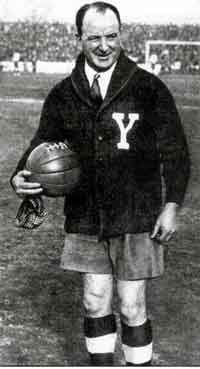|

Paddy McCarthy (1871-1963)
(El Gráfico, 17 May 1946)
|
McCarthy,
Patrick [Paddy]
(1871-1963), footballer
and boxer in Argentina, was born on 17 March 1871 in Cashel, Co.
Tipperary. He studied with the Christian Brothers
and obtained sound marks in swimming and other sports.
McCarthy
arrived in Buenos Aires in 1900 to teach English and
athletics at the Commerce School,
whose headmaster was Co. Clare-born James FitzSimons (1849-1944).
Paddy McCarthy coached professional
and amateur boxers at the Boxing Club of Buenos Aires
(Florida 525). The activity was still unlawful, but he
managed to train and hire several professionals. Other
trainers were the U.S. American Donnally, Alfred Culpin of
Belfast, Willie Williams, and Dublin-born McNamara. Amateur
sparring boxers were recruited among sailors on call in
Buenos Aires, who were invited to boxing festivals by the Rev.
Henry Brady, assistant chaplain in St. John the Baptist
Anglican church, and responsible of the "Missions to Seamen"
in the port of Buenos Aires.
The first professional boxing
match in Argentina was fought on 9 October 1903 by Paddy
McCarthy and the Italian Abelardo Robassio. The
"match-to-finish" - with no preset number of rounds
- was
organised by "El Gladiador" magazine in their rooms. Carlos
Delcasse was the referee and the chief of police Francisco
Beazley acted as time-keeper (though boxing was still
banned!). Paddy won the match by knockout in the fourth
round, reaching the gate money a record $500.
McCarthy
abandoned boxing attending to family reasons, but he was
appointed member of the sports municipal committee in Buenos
Aires together with James Fitzsimons's son Juan Fitzsimons
(1883-1957) and others.
Paddy McCarthy began teaching football techniques at Lobos
Athletic Club. Lobos was the first football club in the
rural area of Buenos Aires, and was founded on 3 July 1892
by a group of Irish Argentines, including Tomás McKeon,
Tomás P. Moore, Tomás Garrahan, Edmundo and Patricio Kirk,
Santiago F. MacKeon, Eduardo Burbridge, Eugenio Seery, Juan
Geoghegan, José Garrahan, Lorenzo Owens, Felix Dolan, Hugo
Lawlor, Eduardo Walsh, William Weir, José Joyce, Eduardo
Slamon, and Eduardo Burbridge jun. Some players
joined those of Lanús Athletic Club to form the team of the
English High School. Ex-pupils of this school later formed
the famous Alumni, winner of nine league championships from
1900 to 1911. After that McCarthy joined Club Atlético Estudiantes
both
as coach and player. He also played in Central Athletic
Club, a small institution in the port of Buenos Aires. In
1904 he was hired by Club Atlético Gimnasia y Esgrima of
Buenos Aires to train its players. He also taught football
to immigrants' children at Boca Juniors, and was a referee of the
Argentine Association Football League during eighteen years.
Football and boxing were some of the athletic activities of
the upper-classes of Buenos Aires and other Argentine
cities. They were restricted to men and perceived as manly
pastimes. Although in the beginning they were
limited to the English-speaking community, by the time
Paddy McCarthy and other professional players and trainers were
active in Argentina, members of the Argentine elite were
actively involved. McCarthy not only taught to
hundreds of Argentines the techniques and rules of these and
other athletic entertainments, but also helped to popularize
them among humbler children in the first decades of the
twentieth century through his job in the sports committee (Dirección de
Deportes) of Buenos Aires municipality. Since the late 1920s,
football and other athletic activities became part of the
regular curriculum in public primary and secondary schools
in the city.
Patrick McCarthy retired from
service in 1943. He died on 10 August 1963 at the British Hospital of Buenos
Aires, being buried in Chacarita cemetery.
Edmundo Murray
References
-
Mastropietro,
Guillermo. Misceláneas Lobenses (Lobos, 2002).
- Peacan del Sar, Marcelo. Paddy McCarthy in "El
Gráfico" Buenos Aires, March 28, June 6, and June 27,
1952.
- Raffo, Víctor. El origen británico del deporte
argentino: Atletismo, cricket, fútbol, polo, remo y rugby
durante las presidencias de Mitre, Sarmiento y Avellaneda
(Buenos Aires, 2004).
|


